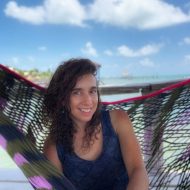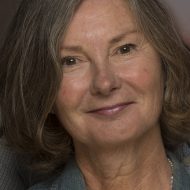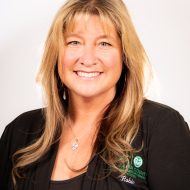


363 Michael Smith Building
Warner College of Natural Resources
1401 Campus Delivery,
Colorado State University
Fort Collins, CO 80523
SEE MAP

Apply to CSU | Contact CSU | Disclaimer | Equal Opportunity | Privacy Statement
© 2021 Colorado State University
John has focused on conservation of Western water, land, and forests for nearly three decades, including at the Colorado Natural Heritage Program and The Nature Conservancy. As director of the Center for Collaborative Conservation, John now strives to equip people and communities with the skills and resources they need to work across differences to address large, complex conservation challenges. John earned a B.S. in engineering from Purdue University, an M.S. in botany from the University of Vermont, and a Ph.D. from the Graduate Degree Program in Ecology at Colorado State University.
“I am intrigued by science, delighted by nature, and passionate about people and the many ways we think, learn, celebrate, and solve problems. I believe in the importance of listening to the many voices who care about and depend on our precious land and water and look forward to working together to create a future where people and nature can thrive.” – John Sanderson
Allison came to the CCC from Explora Science Center & Children’s Museum of Albuquerque, where she led a staff committed to developing and delivering innovative science education programs, as well as a workforce development center. She has been a passionate informal science educator for more than 24 years, and has worked at the Public Lands Institute, Clark County Wetlands Park, Oklahoma City Zoo, and the Bronx Zoo/Wildlife Conservation Society. She holds a B.S. in Biology, an M.S. in Ecology, and a D.A. in Biological Education. Allison believes that empowered and engaged communities are the key to conserving nature and protecting the places we live and love.
Aireona Bonnie Raschke, Ph.D. comes to the Center for Collaborative Conservation (CCC) from Desert Botanical Garden, where she led the Central Arizona Conservation Alliance (CAZCA) as the program director. Through her work with CAZCA, Aireona specialized in collaborative conservation, and led shared work on invasive plant management, ecosystem restoration, and public outreach across central Arizona. Previous to that, she was immersed in studying community-based conservation globally through systematic review and expert consultation, and evaluating the impact of nature-based tourism on the environment and community well-being of Dominica and the Dominican Republic. She’s also an avid hiker, travel blogger, and artist.
While pursuing an undergraduate degree in Forestry from Southern Illinois University, Katie held leadership roles in the Tree Campus USA committee, the Forestry Club, and worked summer internships with the Missouri Department of Conservation and Indiana Department of Natural Resources. She enjoyed studying forest management, and was especially drawn to learning about the human components that affect decisions and outcomes on the ground. She went on to pursue an M.S. in Forest Sciences from Colorado State University, where she joined the Public Lands Policy Group (PLPG) and studied public perceptions of a prescribed fire outreach program on the Colorado Front Range. Shortly after receiving her Master’s, Katie returned to CSU, continuing her research with the PLPG while taking on the new role of Forest Collaboratives Network Coordinator. She looks forward to connecting with new people and supporting collaborative groups across Colorado.
Nicole Reese has supported the Center for Collaborative Conservation’s communication efforts and the Western Collaborative Conservation Network initiative since 2020. Nicole is a CSU Conservation Leadership Through Learning graduate program alum, and has served as a facilitator for collaborative conservation efforts on projects ranging from watersheds to wildfires, from wildlife management to public lands protections. Nicole’s passion for nature and desire to share that passion with others fuels her work in communicating and facilitating collaboration. She is also on the Board of Directors for Sustain Music and Nature, as well as lead facilitator of Crowd Conservation.
Roxie Stricker intends to foster the growth of a more equitable and inclusive natural resource management field through her career here at the CCC. Some core values that guide her in this are community, dignity, and accessibility. As Communications Coordinator, Roxie connects conservation practitioners and academic researchers through her communications support of the Western Collaborative Conservation Network, the Colorado Forest Collaboratives Network, and the CCC Fellows Program.
A recent graduate of the Department of Human Dimensions of Natural Resources (HDNR) at CSU, Roxie continues her involvement in the Feminist Earthways lab as a member in the practitioner-facing realm.
A fresh face in the field, Roxie does her best to place herself in environments with the intention to learn and relate. As a disabled conservationist, Roxie has great interest in connecting with people facing similar barriers to accessibility, as well as in connecting with people interested in collaborative governance, community-building, and arts & crafts. You can reach them at reps@colosate.edu.
Arielle is a proud tribal member of Cochiti Pueblo, a federally recognized tribe rooted in lands currently known as New Mexico. She is a PhD student in Human Dimensions of Natural Resources at Colorado State University. Her interests are reclamation and rematriation of Indigenous and Pueblo land stewardship and food sovereignty, particularly around gender roles and practices. As a Pueblo woman from a long line of matriarchs and land stewards, she is dedicated to supporting tribes in the stewardship of ancestral lands to strengthen Indigenous sovereignty. With over 10 years of experience in tribal land stewardship, Arielle centers Indigenous and Pueblo epistemologies, pedagogies, and worldviews to guide the development and implementation of natural resources projects.
Gemara is a Chicana environmentalist, effective nonprofit leader, scholar and consultant with 10+ years working in community-centered conservation, environmental justice, and environmental education across the Americas. She is dedicated to reducing the institutional, interpersonal, and cultural barriers to land management by Indigenous and other historically marginalized communities within the U.S. and Latin America. Gemara is a PhD student in the Human Dimensions of Natural Resources and outgoing Program Director at Trees, Water & People where she leveraged over $1.5MM to primarily BIPOC-led environmental coalitions & Indigenous land stewardship efforts across Central America.
Fin is a current Colorado State University freshman studying Landscape Architecture, as well as our Office Assistant. Born and raised in Fort Collins, they have cultivated a lifelong love and passion for conserving and protecting nature. They are particularly interested in the biology of forests, crafting cute beanies for their goose statue, and the use of sustainable and native plant garden design as a way to conserve lands. Fin is just at the beginning of their journey in conservation and is excited to learn more about the process of caring for nature.
Richard has years of professional experience as a mediator and team facilitator, especially in resolving complex and dynamic disputes relating to natural resources, land use, transportation, real estate, and change management. He is moved by the power of constructive conversation between people of differing perspectives to discover practical solutions for their common challenges.
Richard has mediated, facilitated, and arbitrated 200+ cases in federal and state courts and agencies as well as for non-profits and business clients. All of the facilitated, multi-party cases have included multiple meetings over many months or quarters. In addition, he has designed, taught or trained 2000+ hours of conflict management, arbitration, negotiation, commercial real estate, land use, and environmental law courses. He currently serves on the facilitator roster of the U.S. Institute for Environmental Conflict Resolution in Tucson, AZ
As an adjunct instructor, Richard has taught for 20+ years at the University of Wyoming, the University of Maryland Law School, Montgomery College, and the Johns Hopkins Carey School of Business. He is currently teaching environmental conflict resolution at the University of Northern Colorado.
As Administrator for the Colorado Watershed Network (back in the last century), and Executive Director for the Colorado Watershed Assembly since 2013, Casey has a long history of coordination with River Watch, the Cherry Creek Stewardship Partners, the Colorado Healthy Rivers Fund and other important programs and projects facilitated by these two organizations. Casey loves to share her enthusiasm for public engagement and participation to find what is working and do more of that. She wants to encourage you all to stay involved with important issues of the day, especially water. Water connects us all!
As the Land Conservation, Planning and Resource Division Manager for Larimer County Department of Natural Resources, Meegan oversees the Departments’ land acquisitions, planning, natural and cultural resource management, and trails programs. She received her M.S. in Natural Resources from Colorado State University and B.A. in Biology from the University of Colorado in Boulder. Prior to graduate study, she worked for the City of Colorado Springs and City of Boulder open space programs.
Education: Received a BS at CSU, 1981, Department of Natural Resources,. Wildlife Biology.
After graduating from CSU, I began my career working in reclamation specialist at a coal mine in Montana and later became a permanent employee with the U.S. Fish and Wildlife Service as a fish and wildlife biologist. During my 33 years with the Service I have worked at the National Elk Refuge, Jackson, Wyoming; the Partners for Fish and Wildlife Program, Kalispell, Montana; and currently work for the Ecological Services program, in Baggs, Wyoming. During my career I was able to form a partnership with CSU/CCC and participate as an Executive Committee member and assist with the Fellows program. Currently, I continue to assist with CCC’s planning efforts and various WCCN committees. I am married to Larry Hicks, have two dogs, and 14 horses.
https://fws.gov/stakeholder-engagement/resource/center-collaborative-conservation-how
Diana Lane
Dr. Diana Lane leads The Nature Conservancy’s thriving rivers and sustainable water supplies strategy in Colorado. In that capacity, she works with partners to create and implement water and watershed management solutions to increase resilience in the face of drought, climate change, and increased water demand. Prior to joining The Nature Conservancy in 2019, Diana had a 20-year career in public-sector environmental consulting, where she worked on large-scale ecological restoration projects for state, federal, and foundation clients. Diana has expertise in restoration ecology and planning, climate adaptation, and management of public funding. Diana holds a BA in Biology from Harvard College, an MS in Rangeland Ecosystem Science from Colorado State University, and a PhD in Biological Sciences from the University of Illinois at Chicago.
As programs director for the Western Landowners Alliance, a landowner-led non-profit advancing policies and practices to sustain working lands, connected landscapes and native species, Hallie manages people and strategy to support stewardship across the American West. At Western Landowners Alliance, Hallie oversees all programming including the Working Wild Challenge program, a landowner-led effort that recognizes the challenge of ranching with wildlife, and facilitates constructive dialogue between wildlife managers and working land stewards to solve problems through peer learning, public policies and increasing access to technical and financial assistance. Previously, Hallie worked for the Department of Energy where she handled compliance with the National Environmental Policy Act (NEPA) and Endangered Species Act (ESA). She holds a B.A. in Environmental Science and a M.A. in International Environmental Policy. In conjunction with her academic studies and early career in the non-profit sector, she worked on many natural resources management and sustainable development projects in Central and South America. Hallie currently serves on Colorado Parks and Wildlife’s wolf reintroduction and management Stakeholder Advisory Group (SAG) and as board president for the Central Colorado Conservancy. In her free time, she enjoys mountain biking, paddling and skiing with her husband and two children.
Dr. Jennifer (Jen) Solomon is an Associate Professor in the Department of Human Dimensions at CSU. Her research focuses on the interface of biodiversity conservation, development, and livelihoods. Jen has been incredibly privileged to work and live in several countries where she has practiced conservation social science with a focus on understanding human behavior. She sees the Center as a major part of the solution to many conservation challenges. “The conservation movement is at a critical juncture in time and nobody can achieve what needs to be done alone. A large part of conservation is about building and sustaining quality relationships so we can achieve the necessary outcomes for wildlife, people and the planet. If we can’t work well together than we are much less likely to succeed.” Working collaboratively on teams with students, organizations and leaders brings her tremendous joy. She was honored to receive a CCC Faculty Fellowship (cohort 5) and be part of a Team Fellowship (cohort 7) for work which took place in southern Belize with partner organizations.
Jessica Western is Principal of Big Goose Creek Resolutions and Research Associate with the University of Wyoming. Big Goose Creek Resolutions finds solutions to complex natural resource problems through social science and design and facilitation of collaborative public policy processes. Dr. Western provides collaborative leadership trainings and assesses, designs, and facilitates collaborative public processes in relation to natural resource issues e.g. related to wildlife, forests and energy. Until recently Dr. Western was Senior Research Scientist in Human Dimensions in Natural Resources and Director of the Collaboration Program in Natural Resources in the Ruckelshaus Institute of the University of Wyoming. Recent and current work includes leading Wyoming Game and Fish Department’s Chronic Wasting Disease Working Group, the Whiskey Mountain Bighorn Sheep collaborative process and creating and providing basic and advanced collaboration training to USFS Region 2’s Forests. Dr. Western is a peer-reviewed social psychologist specializing in the relationship between people and natural resources. She teaches natural resource policy in relation to the United States and the European Union. Dr. Western received her Bachelor’s in Natural Resource Management and Conservation Biology, her Masters in Human Dimensions in Natural Resources and her doctorate in Forest Sciences from Colorado State University.
Geoffrey Whittle-Walls holds a M.S. in Cultural Psychology from Howard University, which unites the methodological practices of psychology and anthropology. He has post- graduate experience working with the social impacts of tourism, psychological trauma, and human behavior. In a former role as a Social Science Specialist at The Nature Conservancy, Geoff supported ocean protection, community-based conservation, and other major protection efforts by applying behavioral analyses and other sources of information and methodologies to characterize aspects of society including, but not limited to, past and current events, the psychology of human relationships and behavior, and socio-cultural and/or economic values to advance conservation and protection of oceans, lands and water. Since late 2022, Geoff has worked as a Behavioral Data Scientist with Pacific Northwest Laboratories where his work focuses on ways to address challenges associated with large quantities of data through two themes: (1) By developing foundational theories of human behavior at diverse social and temporal scales; (2) and by identifying methodological challenges and solutions to enable my team to deliver robust and credible results in binding application domains. It’s Geoff’s understanding that every aspect of human society has stories to tell and it’s my objective to identify the various norms and aspect of social interactions to better understand behaviors and patterns of individuals and groups. In his downtime, Geoff enjoys a good Netflix binge and can also be found exercising by way of long runs or bike rides.
Ms. Young’s career centers on helping land owners and managers with various needs to achieve their goals for their way of life. She has over twenty-five years of working and collaborating with land owners, community members, governments, non-profits, public bodies, and individuals in rural mountain living settings. She has a passion for regenerative agriculture and environmental education.
Through her career, Ms. Young has educated people on natural resource management and conservation including but not limited to: forest and range lands, water and soil, energy, growing food, living with wildlife, and homesteading practices. She uses adaptive holistic resource management practices to help people understand their role on the land, and living in their environment.
Ms. Young has served as a mentor for colleagues and student interns. Her work as a mentor provides knowledge and guidance to those perusing careers in land management. She has also inspired and mentored youth through the 4-H and Youth Development program.